…As Urban Sprawl and “Civilization” swallow us up, a second look at the ‘Hooved Locusts’
by Dave Jarvis
It was just after two in the morning and I heard the soft putter of an All Terrain Vehicle drive past. My neighbor Kris had switched the power on at a large pump on the Timpanogos Canal. Half a block up my street, she rotated a cast iron wheel which turned in the water to start another day of irrigation.
Kris and her sister Kay run a Sheep farm in the north end of Provo Utah. A family operation that has run since the mid fifties. A remnant of earlier days when agriculture was dominant in Utah Valley.
Irrigation day starts early and lasts till late afternoon. Sometimes well after dusk. Night time doesn’t get as dark as it used to around here though. Sodium-vapor street lights have popped up faster than dandelions. Lighting the neighborhood but dimming the stars. Kris spends the first hours working in quiet darkness and approaching dawn.
Kris is easily the hardest working lady I’ve ever met. She lives a life where weekends, overtime, and ‘24-7’ lose much of their meaning. Instead, she moves from one task to the next, picking up a couple more along the way. Working hard is a family value that comes natural after a lifetime of raising Sheep.
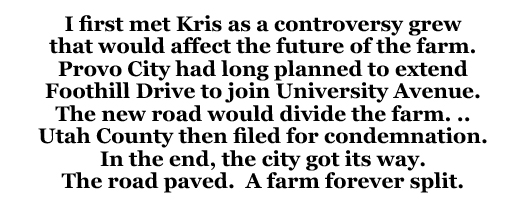
I first met Kris as a controversy grew that would affect the future of the farm. Provo City had long planned to extend Foothill Drive to join University Avenue. The new road would divide the farm. The debate and inevitable court case progressed with frustrations and tempers boiling over at a neighborhood meeting. Clearly, the Johnson family and their quiet farm were both held in high esteem. The Court informed the city that they couldn’t legally condemn property which was an island of unincorporated county land. Utah County then filed for condemnation. In the end, the city got its way. The road paved. A farm forever split. The family has adjusted and kept focused on the work at hand.
My first walk across the undivided Pasture left quite an impression. At the center, I was a hundred yards from pavement. A broad panorama of the mountains surrounding Utah Valley, unobstructed sky, and muted traffic. Not at all like my front yard with constant jarring noise. I was tempted to sit down and gaze in every direction. What was awesome to me seemed an everyday expectation to Kris. Not overlooked or dismissed, but sublimated till a rare break in chores.
Recently, I rode my bike down the gravel road to the south field to visit. Rocks popping from under the tires, spokes humming, an occasional Sheep doodle flipping up. At a steel gate, I struggled to replace a piece of board and cinder block that held it closed.
Kris, in black rubber boots was shoveling out a small drain ditch.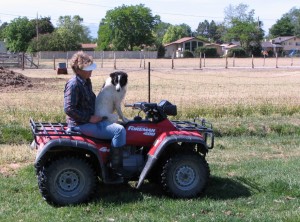
“Out taking a ride, where you headed?” she asked with a friendly tone.
“Just thought I’d drop by.”
Kris, as usual asked how my Mom was.
“Hanging in there, but she’s keepin’ me busy.”
The flock was spread in the eastern end of the field. To the west, near a rustic, open-sided barn, a single sheep, peering over a wooden fence, bleated in protest. Most of the farm yard has a worn look from years of use. The Sheep have a way of rounding the corners of anything made of wood. Tall chain link fencing lines either side of the city right of way.
Sam came over to see who was there. Sam is the farm Sheep Dog. A working dog by pedigree, I’ve only seen her herding Sheep once. When no one was watching. Usually Sam finds a stick or tennis ball to fetch. Pretty good at catching on the fly too. Sam knows how to trigger the chirp at the street crossing. Then barks at the invisible bird.
“So, how’s the Sheep Business doing?”
Kris told of some large operations shutting down. More struggles with the ‘Feds’. In Idaho, some grazing allotments were closed because of Bighorn Sheep conflicts.
“Disease risk?” I asked.
“Yea, They claim that the Sheep and Big Horns rub noses spreading a form of pneumonia. They take out the sheep, and the Pneumonia is still there.” She shrugged, and shook her head.
“Where are Americans going to get their food if all the agriculture gets shut down?” Kris asked.
I thought of the Apple Juice from China, Pickles from India, colorful but itchy wool blankets from Mexico. Local Orchards and produce farms are now mostly a distant memory. Peach trees for trophy homes, an open field now a Chapel, parking, and lawn.
Some of the irrigation ditches in the south field were replaced by large white plastic pipe with small slide-open water gates. Where the old-style ditches remain, rocks, sections of board and orange poly tarp is used to form movable dams. As the water flows across one section of field, Kris rides her ATV to the other side of the new road and adjusts the water to the next section. Sam often hitches a ride on the gas tank.
The North Pasture is bordered by look-alike condos with an eggshell white vinyl fence. The old post and wire sheep fence still lines the field edge.
While waiting for the next change, Kris patiently helps an old Goose with a touch of arthritis take a paddle. A pair of Lambs approach Kay and bleat, waiting expectantly.
“Sorry, I don’t have any Milk or eye medicine.” Kay replies. There is a genuine caring and familiarity for their charges. From winter lambing on, the sisters are present for much of the lives of the flock.
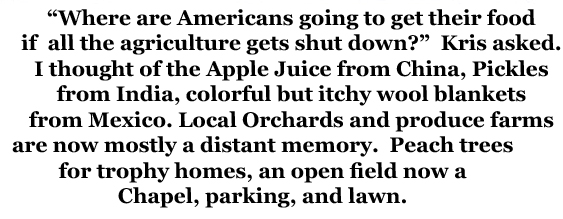
I’ve wondered at the paradox of the love and compassion that Kris and Kaye show for their flock. Yet, one day they will all end up on a dinner table. Or worse, shaved like military recruits.
I’ve never known a Sheep personally. Seen some large herds in southern Colorado’s San Juans, watched over by solitary herders. I’ve groaned at close-cropped vegetation in the Cache Range. Crinkled my nose at the smell, while twitching to get past a slow-to-move herd. Many times I’ve listened to friends and others grumble about “Field Maggots”. That always seemed a bit harsh. Even for an animal that seems so, well, mass produced and dumb as a brick.
Living next to the farm has changed my take on the nature of Sheep. Once, I watched a group of about twenty play follow-the-leader. They’d race in line to one end of the field, back, through two large culverts, then sprint to the opposite end. I sat enthralled as this went on for almost half an hour. Sheer joyous play. I’m not ready to credit the woolies with persona like most dogs have, but they do display community, emotion, and attachment.
When Kris’s father died at the age of 99, the chapel was full, with three rows of flowers the width of the podium. It was different seeing Kris at the funeral in a dress instead of plaid, denims, and Wellies.
Newell Johnson, lived a long life dedicated to family, church and the Sheep Business. Working pasture land, Summer and Winter range, dealing with federal grazing permits, and serving as a vocal advocate for his fellow Sheep-men. I sat, listening to life stories. Taken by the mix of family folklore and civic involvement. Feeling a sense that I’d missed a lot never having met him.
I rode over to the south field again recently. Kris and Kay were riding the ATV across the field.
They stopped near the end of one large white pipe. As I leaned my bike against the fence, Sam came sprinting across the field to greet me. As we walked over to where the sisters worked on the pipe, I noticed that a group of Sheep didn’t bother to move as I walked by. Hmm, they usually shy away.
A lot of debris had washed into the pipe blocking the last 15 feet. The sisters were trying to coax grass, sand, and sticks out of the small gates. It was pretty slow going. I eventually started to pull and prod myself. I cut a long Willow stick that worked to break up some of the sand and mud. They started to pull out parts of a dead Raccoon.
Kris joked, “This is where you find out who your real friends are. Kay added, “We’ll probably never see Dave again!” I pried yet another Sheep doodle out of the narrow gate. Sam took a foul chunk of Raccoon flesh behind the ATV where she rolled in it joyously.
Eventually we got enough water flowing to finish the area serviced by the large pipe. I’d been feeling that I needed to check things at home, so I excused myself and headed back to my bike.
As I walked past the flock, one Lamb started following me bleating repeatedly. I stopped and it came up close still bleating. I scratched it’s wooly head, “What’s up little buddy?” “Baaa?” “Sorry, nothing today. I hopped on my bike and peddled up the road with the little Lamb bleating intermittently like the kid in the closing scene of Shane. Okay, I didn’t ride into the sunset, just across the street. That does make it easy to visit my neighbors, and my new friends in the flock.
Dave Jarvis is a retired community organizer, living in his Mom’s basement, on the edge of Happy Valley, feeling quite smug about his new “unaffiliated” Voter Registration Card.
Click here to read the PDF version of this article
Don’t forget the Zephyr Ads! All links are hot!

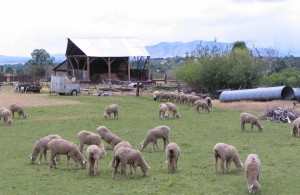
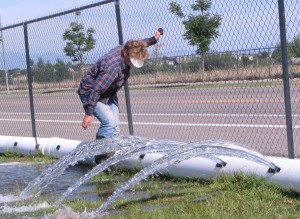
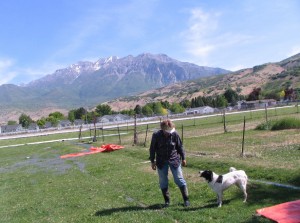
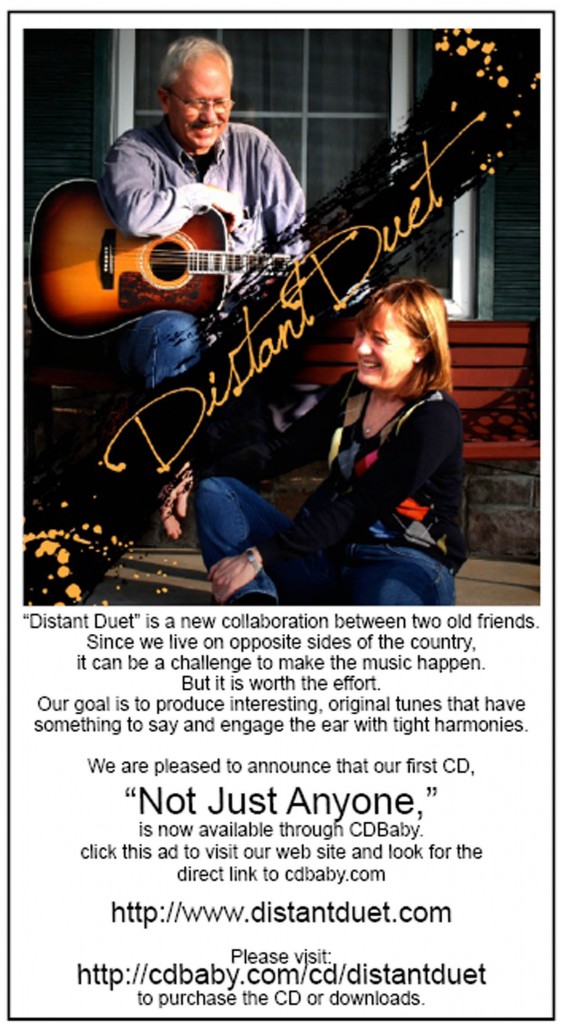
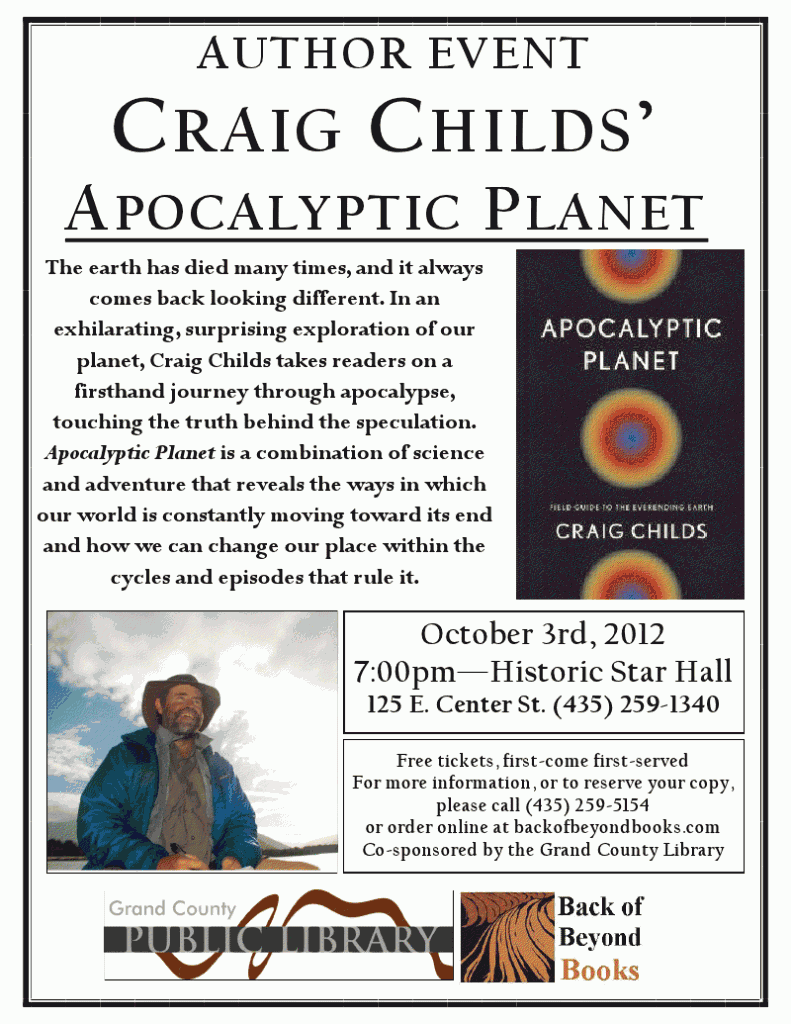

i worked on the road that split the farm.just up to the johnson property .all of us guys working for he davies was hoping the farmer would win….just goes to show you how free we arent.